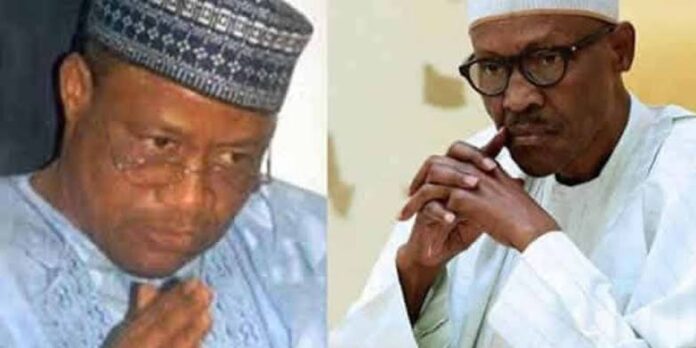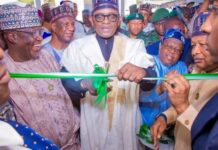IBB explains why Buhari was overthrown
Former Military President General Ibrahim Badamasi Babangida (rtd) has explained his reasons for overthrowing General Muhammadu Buhari’s government in 1985, as well as the drastic economic reforms that followed, including the devaluation of the naira.
Babangida, who served as Chief of Army Staff under Buhari and played a crucial role in the 1983 coup that brought Buhari to power, shared a detailed account of these events in his autobiography, A Journey in Service. The 420-page book, released on Thursday, has stirred controversy, especially on key issues that defined Babangida’s eight-year rule, such as the annulment of the June 12 presidential election, the assassination of journalist Dele Giwa, and the execution of Major General Mamman Vatsa over an alleged coup plot.
‘The 1985 Coup Was Necessary’
In Chapter Six, titled Mounting the Saddle, Defining a Military Presidency, Babangida justified the 1985 coup, framing it as a response to national discontent and worsening conditions. He wrote, “By the beginning of 1985, the citizenry had become apprehensive about the future of our country. The atmosphere was precarious, and ominous signs of clear and present danger were everywhere. It was evident to the more discerning leadership of the armed forces that our initial rescue mission of 1983 had largely failed.”
He argued that failure to act would have led to a split within the armed forces, which could have had disastrous consequences. “If the armed forces imploded, the nation would go with it,” Babangida stated, describing the situation as “frightening.”
He explained that, while the military had initially united in 1983 with a shared purpose, divisions began to surface. He claimed, “The armed forces, as the only remaining institution of national cohesion, were becoming torn into factions; something needed to be done lest we lose the nation itself.”
READ ALSO: June 12: IBB’s attempt to rewrite history, by Kazeem Akintunde
Babangida also criticized Buhari and his deputy, Brigadier General Tunde Idiagbon, for isolating themselves from the military and adopting a rigid, authoritarian approach to governance. According to him, their administration ruled by fear, neglecting the trust and hope of the people. “We were supposed to improve their lives, but instead, we ruled with a series of draconian decrees,” he wrote, describing Buhari’s government as “the private personal autocracy of a stubborn few.”
Economic Hardship and Barter Trade System
Babangida also pointed to the worsening economic conditions and public dissatisfaction as factors behind the coup. “Ordinary people were experiencing severe economic hardship. The general economic and social conditions were worsening by the day,” he noted. Essential goods were scarce, and arbitrary economic controls, such as the return to a barter system in international trade, exacerbated the nation’s financial woes.
He criticized Buhari’s economic policies, including draconian decrees that severely restricted individual freedoms and led to mechanical, harsh justice. He described how junior officers pressured him to take action to preserve the military’s credibility. This pressure, combined with unjust disciplinary actions, led Babangida to oppose certain measures and ultimately consider resignation.
Babangida recounted how he was placed under surveillance after challenging the arbitrary actions of Buhari’s administration. He wrote, “This tense atmosphere culminated in the unanimous decision of a broad spectrum of senior and middle-level officers to change the nation’s leadership. The processes associated with this change were completed without bloodshed by midnight on August 26, 1985.”
A Washington Post report from August 27, 1985, quoted Babangida saying that the Buhari government had been “too rigid and uncompromising,” and had failed to end “economic mismanagement,” which had caused “intolerable suffering.”
The Naira Devaluation and Economic Reforms
One of Babangida’s most controversial decisions was the devaluation of the naira. In Chapter Seven, Reforming the Economy: Privatisation, IMF, SAP, and other Matters, he explained the rationale behind his government’s economic policies. He argued that the Buhari administration’s fixed exchange rate had distorted the economy.
“The primary cause of the crisis in the economy was a total mismatch of supply and demand. The shortage of essential goods was due to uncertain access to foreign exchange,” Babangida wrote. He criticized Buhari’s fixed exchange rate, which created bureaucratic obstacles for businesses and individuals trying to access foreign currency. Babangida also condemned the harassment of Nigerians, such as musician Fela Kuti and businessman Harold Shodipo, for carrying foreign currency.
To remedy these challenges, Babangida’s government introduced a deregulated foreign exchange market, floating the exchange rate instead of fixing it. “We decided to deregulate the foreign exchange market by floating the exchange rate,” he explained, acknowledging that the naira weakened in value but that the policy allowed for a more realistic exchange rate based on market forces.
Privatisation and Economic Liberalisation
Babangida defended his decision to privatise state-owned enterprises, arguing that excessive government control stifled economic growth. “We needed to free the commanding heights of economic activity from the stranglehold of government so that competition among players could improve the supply of goods and services,” he said. He pointed out that many government-run enterprises were draining the economy and failing to be profitable.
Babangida believed that Nigerians would prefer to pay higher prices for goods rather than endure shortages and long queues. “Our perception was that they would rather pay a little more for essential goods and services than suffer the humiliation of endless queues and scarcity,” he wrote. By liberalising foreign exchange access and reducing government control, his administration succeeded in ending shortages and queues.
“It was a hard choice. People had to choose between waiting endlessly in queues or paying a little more for goods,” Babangida concluded, highlighting the logic of the open market.
When reached for comment on Babangida’s allegations, former Senior Special Assistant to President Muhammadu Buhari on Media and Publicity, Malam Garba Shehu, could not be reached by phone and did not respond to a text message.
Follow the Neptune Prime channel on WhatsApp:
Do you have breaking news, interview request, opinion, suggestion, or want your event covered? Email us at neptuneprime2233@gmail.com





